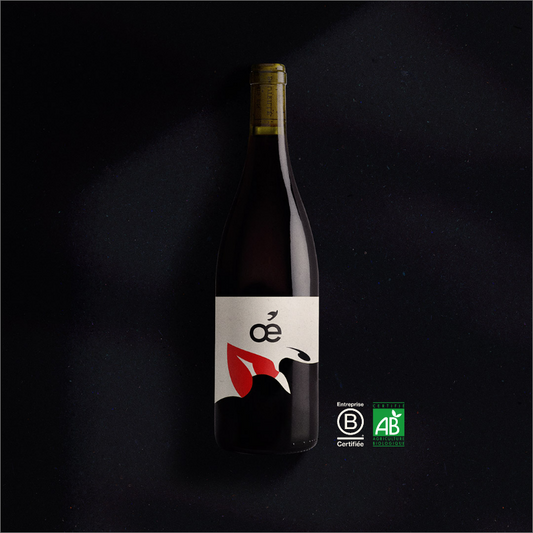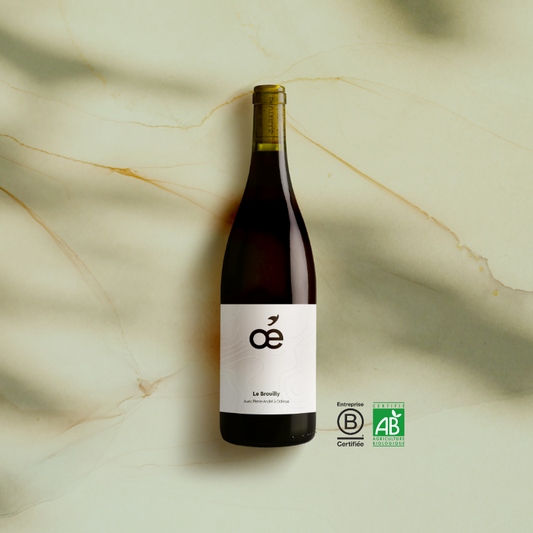The left-luggage office in France has quite a beautiful history. Some of you have already known it fifty years ago in grocery stores and convenience stores, and in the team, we are a little too young to have memories of it or to have it quite simply. experienced. Since last year, it has made a comeback at Oé. And even if recycling is still the number 1 option for many consumers, we have chosen with many players to bring deposit boxes back into fashion in the wine industry. At Oé we have often told you about it: the glass deposit plays a big role in reducing our environmental impact. You remember ? The deposit is 33% less water, 79% less greenhouse gases (GHG) and 79% less energy! To find out more, we give you a brief overview of the deposit and its benefits for our beautiful planet.
The deposit: what is it exactly?
Glass deposit, wines on deposit , returnable bottles, returnable bottles, reuse of glass, reuse of bottles … What is the difference between all these terms! Don't panic, we'll explain everything to you.
A returnable bottle is a bottle that can be recorded, ie brought back to the store in which it was purchased then brought back to a washing center before being reintroduced into the circuit. For example, you can find our returnable bottles at the Patate grocery store in Lyon.

A returnable bottle of wine is a bottle of wine, such as a good Languedoc Rouge for example, which has been, is currently, and will be washed for reuse.
Reusing glass or reusing bottles means reusing bottles instead of recycling them. Recycling consists of melting the pieces of glass already used to make “new” bottles when the returnable bottle is washed and then refilled. We hope you are knowledgeable on the subject!
The deposit: a circular economy
And suddenly, what happens to the returnable bottles ? The bottles are simply received before being washed, cleaned and returned to the producers. Producers of returnable bottles can then bottle them and make them usable again. It's a cycle after all. That's good, it 's about circular economy . A circular economy reuses resources rather than throwing them away after use. This economic system limits wastage and waste and reduces our environmental impact . Cannon, right?
The history of the deposit
If you ask your parents or grandparents, they will surely tell you that in their time, the deposit was a common practice. In the small villages of our beautiful French countryside, we washed our bottles and sent the children to return the bottles to the store in exchange for a small coin. It was in 1799 that the Irish company A & R Thwaites & Co implemented this policy which consisted of paying 2 schillings for 12 empty sparkling water bottles brought back. The deposit then developed all over the world. Very fashionable in France in the 1960s, it was replaced by recyclable containers from the 1980s. The reason? It is the competition with single-use packaging and plastic packaging that has harmed the deposit . The reuse of the bottle has gradually faded in favor of recycling. In this exercise, France is a good student because 80% of the glass is recycled in the country, while an entire glass bottle is 100% recyclable. If you want to know more about the history of the glass bottle , it's here !
The deposit is back in force since 2020. Many startups but also food giants like Danone are trying to bring it up to date. A return in the form of answers to the questions that human beings ask themselves concerning our possibilities of reducing our waste and limiting pollution. And yes, the deposit is much better than recyclable packaging and bottles for the environment. She is also never quite part of some bars, restaurants and festivals.
It is local initiatives that are bringing the deposit back up to date. We can mention our partners “ My bottle is called reviens ”, Rebooteille in the Drôme, Jean Bouteille in Lille, Bout' à Bout ' in the Pays de la Loire, Oc'Consigne in Occitanie, Uzaje in Paris, or even Les Retournées in Aquitaine .
At the government level, the deposit for the reuse of glass is increasingly taken into account. In 2018, the concept of “ solidarity deposit ” proposed by Edouard Philippe took into account the deposit for recycling . And in February of this year the “Climate law” project recommends the use of the deposit for reuse by 2025. These guidelines respond to the objective of the Citizen's Climate Convention which is to reduce greenhouse gas emissions by 40% by 2030 compared to 1990. Yet another step in the right direction!
Oé, “ambassador” of the locker in France
At Oé, we immediately believed in the bottle deposit. This is why we are the first wine brand in France to have reinstated the deposit. We are working hard and with many partners throughout France to develop the practice nationally.

We really wanted our bottles to be used in a cyclic operation :
- You buy your bottle of wine in one of the partner points of sale which provides the deposit , the small sticker indicates the bottles on deposit,
- You pay the grocer the deposit which will be returned to you when the bottle is delivered after tasting,
- The grocery store keeps returnable bottles until one of our distributors collects them,
- The bottles of wine are then brought to one of our washers who takes care of sending them back as new to the deposit circuit.
To find out about all of our partner points of sale that use lockers, it's here !
The advantages of deposit versus recycling
Recycling limits waste when the deposit for the reuse of bottles goes even further: there is no additional energy expenditure linked to the production of new recycled bottles. We now know that a glass bottle can be washed and used up to 50 times. It would be a shame to destroy it after the first use. What do you think ?
The ecological advantages of the deposit
We have already told you about it, recycling is very energy-intensive. To melt the glass, the furnaces heat up to a temperature of 1500 degrees. Washing bottles saves almost 76% energy and will even consume 33% less water compared to recycling. So, let's save energy and consign our bottles instead of recycling them! And if at your scale you don't know how to do it, start by talking about the deposit to your grocers, stores, wine merchants and restaurants near you to encourage them to dive into the bath;)
According to a 2018 study by ADEME (the ecological transition agency), washing bottles also reduces the rate of greenhouse gases generated . With less than 250 kilometers between its point of sale and washing point, the reuse of glass reduces the rate of greenhouse gases generated by 80% compared to recycling. In the end, recycling glass consumes 15 times more energy than reusing it, which in the long term is far from being a drop in the bucket in terms of climate change.
Waste management is also to be taken into account, in bars, cafés and restaurants, the deposit helps to avoid nearly 500,000 tonnes of waste per year in France .
The economic advantages of the deposit
The reuse of wine bottles also has economic and financial advantages, for both the buyer and the producer. The price of packaging is an important part of a product. With the deposit , we recover this amount. And if you regularly buy good organic wine in a returnable bottle, you save a few euros at the end of the month! And yes, with the deposit at Oé, you only pay for what you taste.
For producers, reusing bottles is also less expensive than recycling operations . Recycling costs around 35 euros per tonne for local authorities when reusing glass costs nothing as long as the returnable bottles are reused. And that suits everyone!
The benefits of the deposit for society
The deposit is a new mode of consumption and a civic and voluntary approach that fights against mass production . It is a circular economy that allows the establishment of washing centers and the creation of local jobs that cannot be relocated.

The shorter the distances between the manufacturer, the point of sale and the washing center, the more the environmental impact of the practice will be reduced. Disposables and recyclables generate a lot of transport in sorting centres, for example. The deposit compensates for this with its own mode of transport. This is the reason why reuse is based on a short circuit. At Oé, we respond to this concern for consistency with our local partners:
Encouraging the reuse of returnable bottles means supporting local initiatives for the management of our bottles. At Oé, we are convinced that the deposit has a real role to play in preserving our planet. We are proud to be the first wine brand to have brought it up to date and to see it come to life through all our grocers, wine merchants and restaurant partners.
Discover all our locker partners here!





